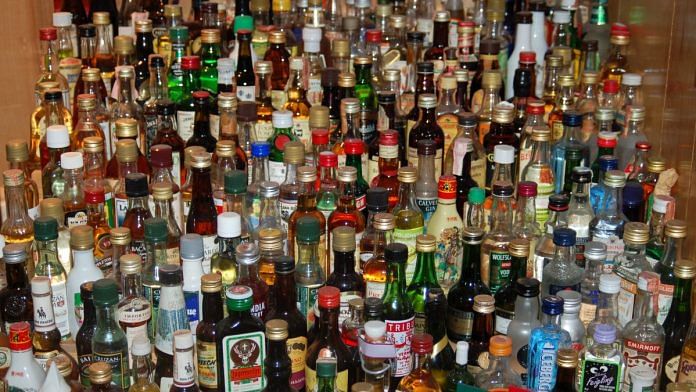New Delhi: As the India-UK free trade agreement (FTA) negotiations pick up pace, the Indian domestic liquor industry has said that it understands the need for such deals in “the larger economic context” but that tariff cuts should be “gradual”.
India-UK FTA talks began in January this year and have entered their fifth round. The deal is slated to be finalised by Diwali this year.
India exported about $400,000 worth of alcoholic beverages in 2021-22 against imports to the tune of $192 million from the UK, according to government data.
“The domestic industry recognises the need for FTAs in the larger economic context and is willing to support reduction in tariff. However, we believe that the concessions under FTA should be gradual and phased out,” said Vinod Giri, Director General of the Confederation of Indian Alcoholic Beverage Companies (CIABC), in an interview with ThePrint.
CIABC is a domestic liquor body that represents Indian brands like Amrut Distilleries, Third Eye Distillery and Devans Modern Breweries.
The body is proposing a reduction in customs duty on imported liquor from the current 150 per cent to 100 per cent, followed by a final rate of 50 per cent over a 10-year period. In contrast, the international liquor industry is asking for a sharper cut — a reduction from the current 150 per cent to 75 per cent followed by a final rate of 30 per cent over a 3-5-year period.
All imported alcohol entering India attracts 150 per cent customs duty, which is among the highest in the world.
Also Read: Blame it on Covid: Fewer Indians taking to booze, those who drink are drinking more, finds NFHS
Maturation standards for Indian exports
The domestic industry says if New Delhi is offering tariff cuts on liquor, London must remove non-tariff barriers on Indian exports. For instance, the three-year maturation standard for whisky.
Maturation is the process of whisky taking up flavours from the cask or barrel in which it is stored. According to UK law, all whisky must be matured for a minimum of three years.
Asked if removal of maturation standards will make Indian whisky less competitive, Giri said, “Let the customer decide.”
“There’s a Johnnie Walker Black Label, which has a 12-year age claim, and a Johnnie Walker Double Black, which has no age claim. The Double Black is, in fact, priced higher than the Black Label, and yet it does decently well. Or let’s say there’s an Old Monk sitting on a shelf next to a foreign rum. The customer may still reach for the Old Monk because of its nostalgic value.”
Another non-tariff barrier that the domestic industry is seeking to change is the British definition of the product that restricts it to whisky made from grain.
“We don’t just make alcohol from barley in India, but also molasses, rice and a little bit of wheat,” said Giri, adding that sharp tariff cuts could hurt the domestic liquor industry.
“We’re talking about an industry that employs a large number of barley farmers in states like Rajasthan and Madhya Pradesh, wheat and rice farmers in Punjab as well as states in the east and northwest, and sugar farmers in Maharashtra, Uttar Pradesh and other areas.”
‘Less incentive for multinationals to invest in India’
In India, liquor is imported in two ways: in bottles (Bottled in Origin or BIO), or pure alcohol imported in bulk and bottled in India (Bottled in India or BII).
If tariffs are sharply cut, it could reduce the incentive of multinationals to invest in BII facilities, said Giri.
“The reason international players import in bulk and bottle alcohol here is because they want to save duty on packaging and denatured water. If you reduce the duty, the incentive to invest in the factories and plants in India goes away.”
Importance of threshold prices
When it comes to tariff cuts on liquor, it is important to look at threshold prices.
In simple terms, a threshold price or a minimum import price defines those imported goods that stand to benefit from tariff cuts and those that do not.
For example, in the India-Australia early harvest deal, known as the Australia-India Economic Cooperation and Trade Agreement (ECTA), signed this year, New Delhi agreed to reduce the duty on Australian wines.
A report by think tank Indian Council for Research on International Economic Relations (ICRIER) claimed that the threshold prices were very high, meaning that only high-end wines would benefit from tariff cuts.
CIABC, which was involved in the ECTA discussions, argued that the Australian wine industry has been sensitive to Indian concerns and has not raised any objections to the proposed threshold prices.
“The Australian grape and wine industry has not raised any objections to the tariff cuts that were eventually agreed upon. It’s important to have the focus on high-end wines to help upgrade the Indian wine industry,” said Giri, adding, “We don’t want cheap table wines. We want our consumers to be exposed to great products.”
When it comes to the India-UK FTA, threshold prices are another bone of contention between domestic and international liquor bodies. While the former is pushing for $5 per bottle, the latter wants it at $2 per bottle.
CIABC fears that if the threshold price is below $5, it would amount to “under-invoicing” and dumping of goods in the Indian market. Under-invoicing is when the stated value of imports exceeds their actual value.
(Edited by Amrtansh Arora)
Also Read: Shaken, stirred & appreciated — these clubs are making connoisseurs of India’s liquor consumers



